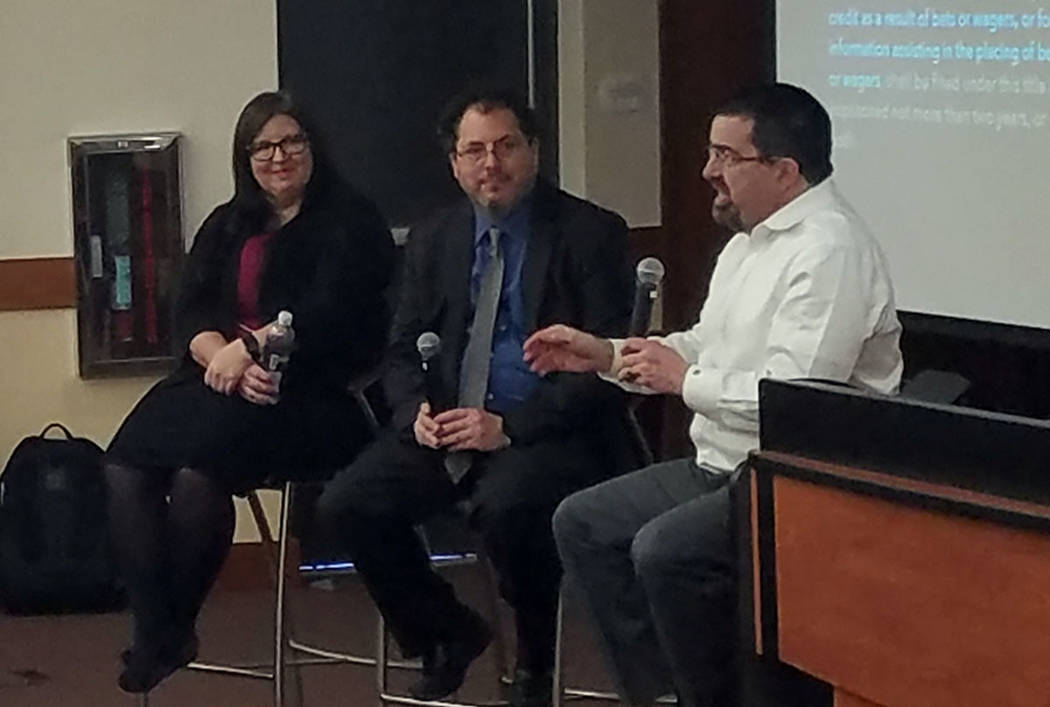Appeal almost inevitable in Wire Act reinterpretation case, expert says
Big changes could be on the horizon for the gaming industry if the January reinterpretation of the federal Wire Act becomes a U.S. Justice Department mandate.
But how likely is that to happen?
Three law professors at the UNLV William S. Boyd School of Law tackled that question Thursday in a Moot Court presentation.
Broadly, the reinterpretation could further restrict internet gambling. The Justice Department reversed some of the stances the it made in 2011, when it interpreted the law to ban sports betting but enabled interstate poker play and lottery sales. The new interpretation bans all forms of interstate betting, including sports wagering, and also includes other gambling-related interstate communications.
The three professors agreed intrastate internet and mobile sports wagering, online lottery ticket sales, and online poker and casino play are most endangered.
But a lot can happen between now and June 14, the date the Justice Department’s 90-day implementation calendar and an added 60-day extension concludes.
The New Hampshire Lottery and one of its suppliers already have filed lawsuits against Attorney General William Barr and the Justice Department to block implementation of the new interpretation and the states of Pennsylvania and New Jersey are gathering research for a potential lawsuit.
UNLV law professor Anthony Cabot, a distinguished fellow in gaming law, said regardless of which side wins in the New Hampshire case, an appeal is almost inevitable.
“I think it’s going to be appealed in the First Circuit, no matter who wins or loses,” Cabot said. “I have a feeling the U.S. Department of Justice loses any appeal in the First Circuit. And, if Pennsylvania or New Jersey came on board, we’d have a Third Circuit case. If Nevada comes on board, we’d have a Ninth Circuit case.”
State gaming regulators nor any individual casino companies have indicated whether they would challenge the Justice Department edict. Multiple appeals court cases could lead to a U.S. Supreme Court showdown.
Cabot said the New Hampshire cases directly address the interpretation’s possible effects on internet communication to transmit information on wagers. The attorneys general of Pennsylvania and New Jersey sent a letter to the Department of Justice asking that the new interpretation be withdrawn.
New Jersey Attorney General Gurbir Grewal also has made a Freedom of Information request for records showing a relationship between private casino interests who oppose internet gaming and the new opinion.
Cabot said the Justice Department determination would affect state governments, vendors and suppliers, advertisers, payment providers and other affiliates.
He was joined in the presentation by adjunct professors Jennifer Roberts and Gregory Gemignani, who both explained the history of the Wire Act from the 1950s when it was passed as a means to fight organized crime and illegal gambling.
Contact Richard N. Velotta at rvelotta@reviewjournal.com or 702-477-3893. Follow @RickVelotta on Twitter.
Affected or not?
UNLV law professor Anthony Cabot, a distinguished fellow in gaming law, said depending on the Justice Department's further explanation of its reinterpretation of the Wire Act, different gaming activities could be affected:
— State lotteries. Online lottery sales and instant tickets would be illegal. Powerball and multistate lotteries probably would still be permitted, he said.
— Poker and casino games. Online poker and casino games are endangered, he said. Multistate internet gaming agreements, including the one former Nevada Gov. Brian Sandoval negotiated with the states of New Jersey and Delaware would be illegal.
— Sports wagering. Intrastate internet and mobile sports wagering is endangered because messages sent through servers could potentially cross state lines, Cabot said.
— Horseracing. Because it operates under different laws, horseracing may be legal, even though the Justice Department issued an opinion that off-track wagering violates the Wire Act.
— Daily fantasy sports. Cabot says they probably wouldn't be impacted because they're considered skill games and not games of chance in many states and courts have ruled that entry fees are not considered bets or wagers.























